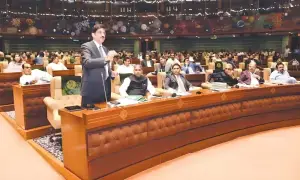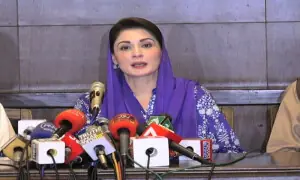Indian state passes controversial civil code affecting minorities
3 min readLawmakers in a small Indian state ruled by Prime Minister Narendra Modi’s Hindu nationalist Bharatiya Janata Party (BJP) on Wednesday approved landmark legislation to unify personal laws across religions, a move opposed by many minority Muslims.
Approval by the Himalayan state of Uttarakhand makes it the first in the country since independence from Britain in 1947 to implement a Uniform Civil Code, a contentious decades-old BJP promise, months before national elections.
Currently, India’s Hindus, Muslims, Christians and other minority groups follow their own personal laws and customs, or an optional secular code for marriage, divorce, adoption and inheritance.
The move by Uttarakhand banning polygamy and other Muslim practices is expected to pave the way for other BJP-ruled states to follow suit despite angry opposition from some leaders of India’s 200-million strong Muslim minority.
“The Uniform Civil Code will give the right to equality to everyone without any discrimination. … We must make history by clearing it,” said Pushkar Singh Dhami, the state’s chief minister, just before BJP lawmakers and some others voted in favour of the bill.
A political aide to Dhami confirmed that the state assembly, where the BJP enjoys a majority, passed the bill.
Rooted in the framework of the Indian Constitution, the code puts an end to religious interpretation of laws guiding marriage, divorce, maintenance, inheritance, adoption and succession.
Dhami said it “provides security to women and empowers them.”
The code sets a minimum marriageable age for both genders. It guarantees equal rights to men and women on issues pertaining to divorce, share in ancestral property and offers rights to adopted children, those born out of wedlock or were conceived through surrogate births.
A legal expert working on the UCC bill in Uttarakhand said Islam’s Sharia laws permits polygamy and has no stringent rules to prohibit marriage of minors.
India is around 80% Hindu and about 14% Muslim and is the world’s third-largest Muslim country. Muslims accuse Modi’s right-wing nationalist party of pursuing a Hindu agenda that discriminates against them and directly imposes laws interfering with their faith.
Modi denies this but the situation has led to sporadic violence between members of the two communities.
A regional Muslim politician from south India, Asaduddin Owaisi, said the code was nothing but a “Hindu code of conduct.”
“I have a right to practise my religion and culture but UCC stops us from exercising our fundamental rights,” he told Reuters.
The new code makes it mandatory for a man and a woman to register their marriages and also submit a notice if they are in a live-in relationship to a government office. Terminations of live-in relationships should also be reported to the police.
“The Uttarakhand UCC is patriarchal to the core,” Subhashini Ali, a senior member of the Communist party of India(Marxist), said on X.
It “denies women the right to choice. An inter caste couple going to register their marriage is inviting death,” she said.
Many young Indians on social media said the move to register live-in relationships was a direct assault on privacy but the BJP rejected the criticism.
“As society evolves, you (government) need to regulate new practices,” Uttarakhand Child and Women Welfare Minister Rekha Arya told NDTV newschannel. “It’s a modern move and not an attempt to invade anyone’s privacy.”
Many BJP-ruled states such as Gujarat, Uttar Pradesh, Assam and Rajasthan have decided to introduce the UCC, a national civil code that is one of the three core promises of Modi’ BJP political manifesto.
The other two were removing the autonomy of the only Muslim majority region of Jammu and Kashmir in 2019 and building a contested temple to Hindu deity Ram, replacing a centuries-old mosque razed by hardline Hindus in 1992.
For the latest news, follow us on Twitter @Aaj_Urdu. We are also on Facebook, Instagram and YouTube.


























Comments are closed on this story.